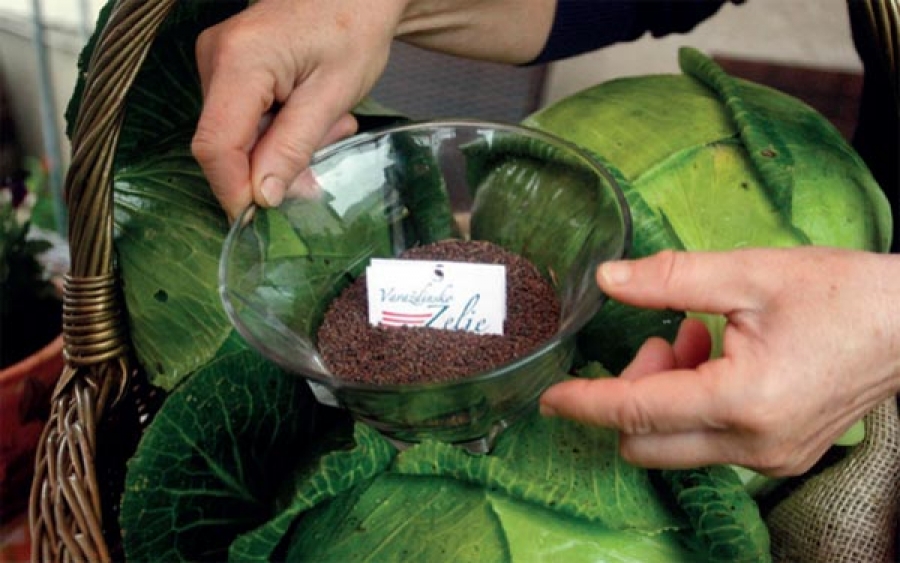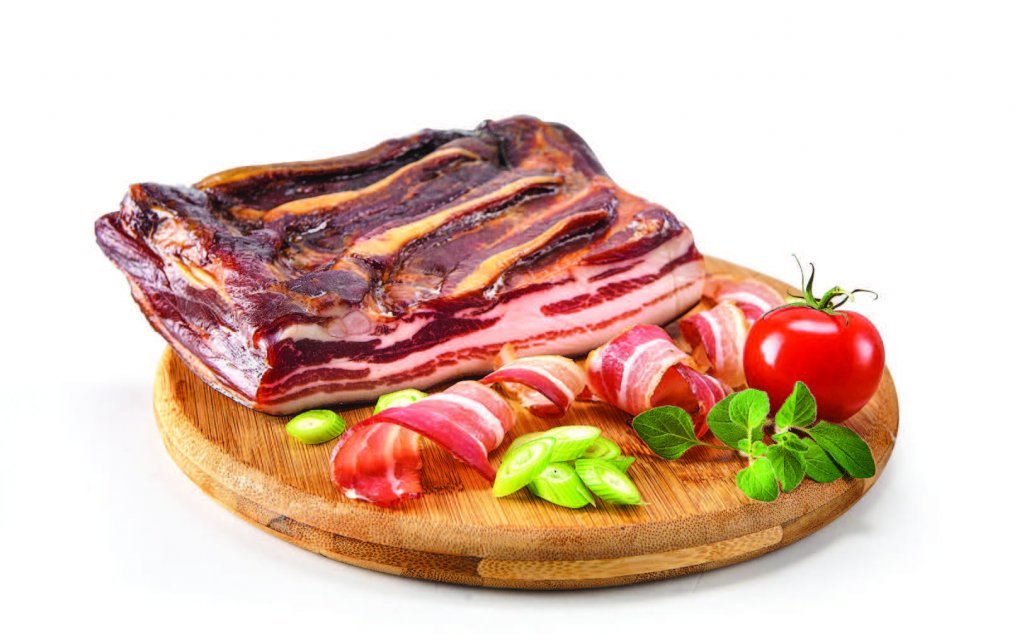Lika Škripavac Becomes 32nd Croatian Product With EU Protected Name
December 21, 2021 - The Ministry of Agriculture reported on Tuesday that the Lika škripavac has become the 32nd Croatian product with a protected name in the European Union (EU), which guarantees consumers the purchase of an authentic product.
Turističke Priče reports that the Lika škripavac has been awarded the European protected geographical indication, which the European Commission has published in the Official Journal of the European Union. Thus, Lički škripavac is entered in the register of protected designations of origin and protected geographical indications and protected throughout the European Union. The EU trademark, like the geographical indication on the packaging, guarantees consumers the purchase of an authentic product.
The process of protection of the name Lički škripavac began in December 2017, when the Association of Small Cheesemakers of Lika-Senj County "Lički škripavac" submitted a request to the Ministry of Agriculture to protect the geographical indication called "Lički škripavac".
Lika škripavac is a soft, fatty cheese with a cylindrical or square shape. It is milky-white on the surface without crust and closed in cross-section or with a small number of mechanical openings created by the retention of whey during cheese shaping. Its taste is milky-sweet and moderately salty, and the consistency is characteristically gummy and squeaks during consumption. The production method of Lika škripavac has been passed down from generation to generation and has been preserved to this day, and the squeaking property, after which this cheese got its name, is due to the high content of milk fat and protein in milk.
The production of Lika škripavac is allowed only in the geographical area of Lika from the milk of cows raised in that area. The production area is located in three administrative regions, mostly in Lika-Senj County, and to a lesser extent in Zadar and Karlovac Counties.
The Republic of Croatia now has 32 agricultural and food products whose name is registered in the European Union as a protected designation of origin or a protected geographical indication. In addition to the currently registered name "Lički škripavac", the product names registered so far are: Krk prosciutto, Extra virgin olive oil Cres, Neretva mandarin, Ogulin sauerkraut / Ogulin sauerkraut, Baranja kulen, Lika potatoes, Istrian prosciutto / Istrian prosciutto, Drniški prosciutto, Drniški prosciutto, Poljički soparnik / Poljički zeljanik / Poljički uljenjak, Zagorje turkey, Krk olive oil, Korčula olive oil, Pag lamb, Šolta olive oil, Varaždin cabbage, Slavonian kulen / Slavonian kulin, Međimurje meat 'from tiblica, Slavonian honey Istria, Paška sol, Zagorski mlinci, Paški sir, Bjelovarski kvargl, Brački varenik, Varaždinski klipič, Malostonska kamenica, Rudarska greblica.
Make sure to follow our dedicated Made in Croatia page for more news like this.
Varazdin Cabbage Queen on Most Innovative Woman in EU Agriculture Shortlist
February 12, 2021 – Marija Cafuk, who successfully lead the campaign to have Varazdin cabbage protected by the EU, has been shortlisted for the award of Most Innovative Woman in European Agriculture. She used the opportunity to voice her concerns for Croatia's small producers under proposed new changes in the laws on seeds
Inexpensive and packed with nutrients and vitamins C + K, the humble cabbage is a staple part of the Croatian diet. One of its most famous varieties is Varazdin cabbage (Varaždinsko zelje), which is protected at a European level as distinct in coming from its point of origin.
Varazdin cabbage's successful entry into European protection is in no way thanks to the efforts of Varazdin resident Marija Cafuk, who is the custodian of Varazdin cabbage seeds and the only person in Croatia who is licensed to sell them. For her efforts, she has now been shortlisted by the European Association of Agricultural Producers Copa Cogeca for the award of Most Innovative Woman in European agriculture.
According to Copa Cogeca, the award aims to highlight the contribution that women make to rural development and the development of new models of food production in the context of climate change and environmental protection.
“Of course, I was pleasantly surprised by the nomination, which I think is a recognition of the long struggle to preserve our Varazdin cabbage seeds in conditions when we lost the last companies that were engaged in seed production and (had to) depend on imports,” Mrs. Cafuk told journalist Zlatko Simic in a recent interview with Jutarnji List. “You know how many conditions we had to meet in order for our seeds to be on the variety list! Let the EU see that there are people in our country who want to preserve their indigenous varieties for future generations.”
The latter part of her comment to the journalist refers to the proposed changes in seed registration laws that are looming on the horizon at both a national and an EU level. Small producers and family farms in Croatia are concerned about the loss of traditional seed varieties and their abilities to grow from them under the conditions of the changes in legislation. Varazdin cabbage (Varaždinsko zelje) and its seeds © Varazdin County Tourist Board
Varazdin cabbage (Varaždinsko zelje) and its seeds © Varazdin County Tourist Board
“The problem is not only in paying the large costs we have in controlling the sowing of our certified seeds,” Mrs. Cafuk told the journalist, expanding on the matter of the changing seed laws, “but also in increasing the costs we may have if we had to deliver all the seeds we produce for processing, as (will be) required by law.”
Mrs. Cafuk told the journalist she hopes that the ongoing and popular protests and petitions of associations that keep domestic seeds will lead to a positive outcome in regards to the proposed national changes. Of course, she was speaking on behalf of seed custodians and small producers all over Croatia. Having attained its European protection already, Varazdin cabbage and Mrs Cafuk's enterprises are already safe.
Varazdin cabbage is one of two kinds of Croatian cabbage protected by the EU
There are in fact two types of Croatian cabbage protected at the European level – Varazdin cabbage and cabbage from Ogulin. But, whereas Varazdin cabbage is protected in its raw, unprocessed form, the cabbage from Ogulin is protected as a product after its fermentation (it is made into what is sometimes called sauerkraut).
In 2015, when the application was made to European authorities to protect Varazdin cabbage, a notice of opposition was lodged from nearby Slovenia. Slovenia had added new cabbage varieties to its national variety register in 2012 under the names ‘Varazdinsko 2’ and ‘Varazdinsko 3'. Varazdin is a centuries-old town in northern Croatia.
The notice of opposition was discounted. The EU office responsible for protecting new varieties did not consider Varazdinsko 2 and Varazdinsko 3 to be appropriate names, as they suggested a link to a geographical area with which they had no direct connection and to that extent were confusing to consumers. With this impasse of international cabbage recognition finally overcome, Varazdin cabbage was granted its European protection.
Dalmatian Bacon Joins Prosciutto With European Protection
February 16, 2021 – Pršut tends to hog the limelight when people discuss Croatia's mastery of preserving pig, but prosciutto is far from the whole story. Croatian bacon is the best bacon in the world! Having now attained EU-protection, Dalmatian bacon looks set to rightly become the next most famous export of traditional pork produce from the region.
If you've visited Croatia – perhaps, even if you haven't – you'll have tried or at least heard of its famous prosciutto. Known locally as pršut, this dry-cured ham is a renowned delicacy. Taking pride of place at every public buffet, it is served thinly sliced, usually uncooked and savoured simply alongside bread, cheese, wine and olives. It is enthusiastically imported from Croatia across Europe and no less than four Croatian prosciutti from different regions are protected at an EU-level. But, pršut is not the be-all and end-all of Croatia's mastery with preserving pig.
As well as famous sausages like Kulen, kobasica and krvavica, Croatia is also brilliant at making bacon. That's no overstatement. They are not just good at it – Croatian bacon may be the finest you will ever try.
The best bacon made in the country usually come from Dalmatia and Slavonia and is, like Dalmatian prosciutto, smoked. Though Dalmatian bacon may stand slightly in the shadows of the region's more delicate pršut, this more robust and flavoursome product is featured within a greater wealth of traditional, cooked dishes and praised by anyone who tries it. Dalmatian panceta © Gavrilovic
Dalmatian panceta © Gavrilovic
However, the secret of Dalmatian bacon may soon be let out of the bag. This traditionally made product has received the same EU-protection as Dalmatian prosciutto. Sometimes called slanina or panceta (even though, in Italy, the title of pancetta is usually reserved for bacon which is not smoked), Dalmatian bacon was protected at a national level in 2019, the first steps required in order for it to apply for a similar classification within the EU. Confirmation of its EU-awarded protection was announced by the Croatian Agriculture Ministry on Tuesday 16 February 2021
Dalmatian bacon is salted by hand, pressed and smoked. Unlike bacon available in other countries, Dalmatian bacon is only ever that which is elsewhere called 'streaky' bacon, as opposed to 'back bacon'. It is made from pork belly and chest. It has belts of whitish fat running along its length, which carry a substantial amount of flavour. Its traditional salting and smoking process are so thorough that it can be eaten raw, uncooked and is regularly enjoyed in this way.
Dalmatian bacon is aided in its preservation by low winter air temperatures and in its drying by seasonal winds.
Olive Oil from Šolta the Latest to be Protected at EU Level
The newest addition on the list of EU protected Croatian products is olive oil from Šolta, added into the registry on 21 October, 2016.


